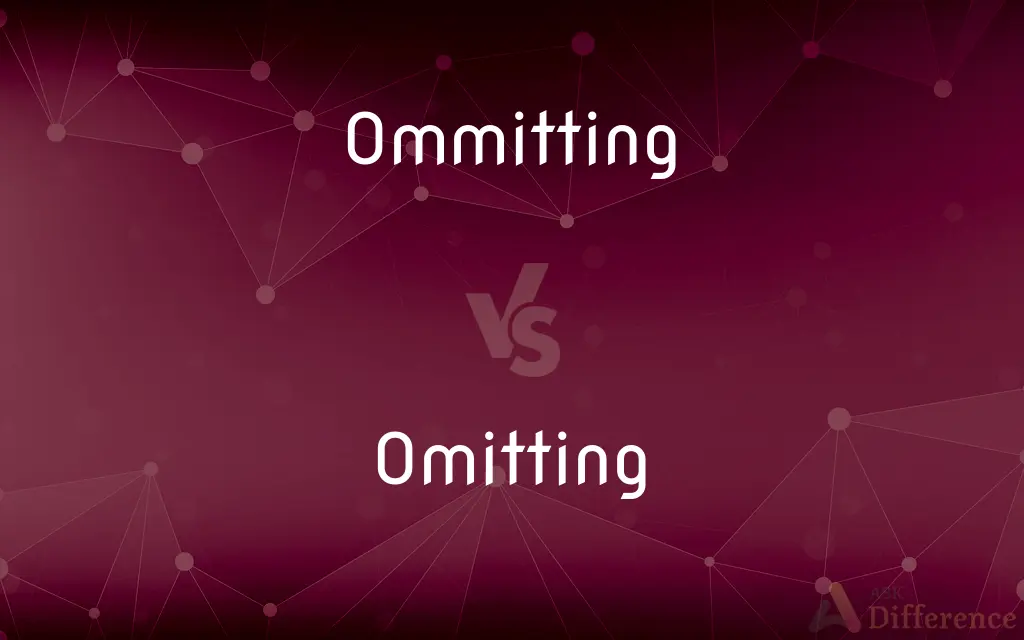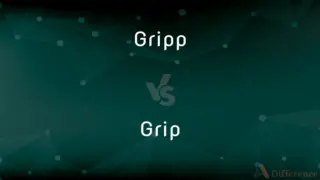Ommitting vs. Omitting — Which is Correct Spelling?
Edited by Tayyaba Rehman — By Fiza Rafique — Updated on March 31, 2024
"Ommitting" is an incorrect spelling, while "Omitting" is correct, referring to the act of leaving out or excluding something.

Table of Contents
Which is correct: Ommitting or Omitting
How to spell Omitting?

Ommitting
Incorrect Spelling

Omitting
Correct Spelling
ADVERTISEMENT
Key Differences
When you omit something, it's one less – hence one 'm'.
"Omit" has one 'm', so "omitting" should too.
Double 't' but not double 'm' in "omitting."
Relate "omit" to "one," both start with 'o' and have one 'm'.
Think of "omit" as "one missing thing" – only one 'm' is present.
ADVERTISEMENT
How Do You Spell Omitting Correctly?
Incorrect: She keeps ommitting her name from the sign-up sheet.
Correct: She keeps omitting her name from the sign-up sheet.
Incorrect: He was ommitting important details from his story.
Correct: He was omitting important details from his story.
Omitting Definitions
Omitting can signify neglecting to do something.
By omitting his exercises, his health suffered.
Omitting refers to the act of not including or mentioning.
Omitting the key details made the story confusing.
Omitting is the process of bypassing or disregarding.
She's omitting the irrelevant points in her report.
Omitting conveys a deliberate exclusion.
The editor is omitting the redundant paragraphs.
Omitting means leaving out or excluding something.
She's omitting sugar from her diet.
To fail to include or mention; leave out
Omitted an important detail from the report.
To fail or neglect to do (something)
Omitted his daily walk during our visit.
To fail or neglect (to do something)
I omitted to mention that I don't eat meat.
Present participle of omit
An act of omission.
Omitting Meaning in a Sentence
By omitting the unnecessary details, the author made the story more engaging.
The editor suggested omitting the last paragraph to strengthen the article's impact.
The student was omitting crucial steps in the math problem, leading to incorrect answers.
The teacher noticed that the student was omitting vowels in most of her written words.
The software update was omitting features that were crucial to some users.
When writing his autobiography, he considered omitting the chapters about his childhood.
Omitting the salt from the recipe made the cake taste bland.
She was worried about omitting any key points in her presentation.
The movie adaptation was criticized for omitting important scenes from the book.
Common Curiosities
What is the verb form of Omitting?
The verb form is "omit."
What is the pronunciation of Omitting?
Omitting is pronounced as [o-MIT-ing].
Why is it called Omitting?
It's called omitting because it describes the action of leaving out or excluding something.
What is the singular form of Omitting?
Omitting is a verb form and doesn't have a singular or plural. However, "omits" is one of the singular forms of the verb "omit."
What is the root word of Omitting?
The root word is "omit."
Is Omitting a noun or adjective?
"Omitting" is a verb form (gerund).
Which vowel is used before Omitting?
Typically, the article "a" is used, as in "a omitting detail."
What is the plural form of Omitting?
As a verb form, "omitting" doesn't have a plural.
Which article is used with Omitting?
Both "a" and "the" can be used depending on the context.
Which conjunction is used with Omitting?
Any conjunction can be used with "omitting," depending on the sentence context.
Is Omitting an adverb?
No, omitting is not an adverb.
Is the word Omitting imperative?
No, "omitting" is not in the imperative form.
Is Omitting an abstract noun?
As a gerund, "omitting" can function as a noun referring to the action of leaving out.
How do we divide Omitting into syllables?
O-mit-ting.
Which determiner is used with Omitting?
Determiners like "a," "the," "some," "any" can be used, depending on the context.
What is the first form of Omitting?
The first form is "omit."
Which preposition is used with Omitting?
Prepositions like "from" can be used, as in "omitting from the list."
Is Omitting a vowel or consonant?
The word "omitting" starts with a vowel.
Is Omitting a countable noun?
When used as a gerund (noun form), it's uncountable.
Is Omitting a collective noun?
No, omitting is not a collective noun.
How many syllables are in Omitting?
There are three syllables in "omitting."
Is the word Omitting a gerund?
Yes, "omitting" is a gerund.
What part of speech is Omitting?
Omitting is a verb (specifically, a gerund).
How is Omitting used in a sentence?
"Omitting crucial information can lead to misunderstandings."
Is the Omitting term a metaphor?
By itself, no. But in specific contexts, it can be used metaphorically.
What is the stressed syllable in Omitting?
The second syllable, "mit," is stressed.
What is another term for Omitting?
Another term could be "excluding."
What is the second form of Omitting?
The second form is "omitted."
Is Omitting a negative or positive word?
"Omitting" is neutral; its connotation depends on context.
Is the word “Omitting” a Direct object or an Indirect object?
"Omitting" can function as a direct object, depending on the sentence structure.
What is the opposite of Omitting?
The opposite could be "including."
What is the third form of Omitting?
The third form is also "omitted."
Share Your Discovery

Previous Comparison
Marocco vs. Morocco
Next Comparison
Gripp vs. GripAuthor Spotlight
Written by
Fiza RafiqueFiza Rafique is a skilled content writer at AskDifference.com, where she meticulously refines and enhances written pieces. Drawing from her vast editorial expertise, Fiza ensures clarity, accuracy, and precision in every article. Passionate about language, she continually seeks to elevate the quality of content for readers worldwide.
Edited by
Tayyaba RehmanTayyaba Rehman is a distinguished writer, currently serving as a primary contributor to askdifference.com. As a researcher in semantics and etymology, Tayyaba's passion for the complexity of languages and their distinctions has found a perfect home on the platform. Tayyaba delves into the intricacies of language, distinguishing between commonly confused words and phrases, thereby providing clarity for readers worldwide.







































